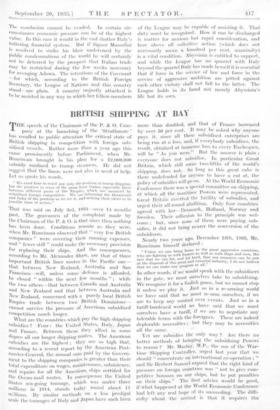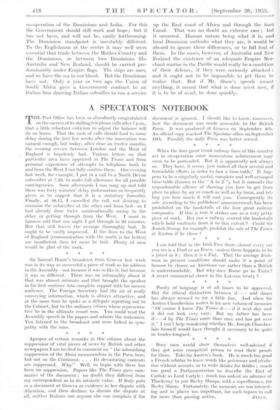BRITISH SHIPPING AT BAY
THE speech of the Chairman of the P. & 0. Com- pany at the launching of the ,`Strathmore ' has recalled to public attention the critical state of British 'shipping in competition with foreign sub- sidised vessels. Rather more than a year ago this came prominently before Parliament, when Mr. Runciman, brotight in his plan for a £2,000,000 subsidy confined to tramp steamers. He did not suggest that the liners were not also in need of help. Let us quote his words, " We must boar in mind not only the position of tramp shipping, but the position in some of the great liner trades, especially those between different parts of the Empire, which are menaced by subsidised kireign competition. We are informing the Dominions and India:of the position as we see it, and seeking their views as to Possible lines of action.", That was Said on July 3rd, 1934—over 14 months past. The gravamen, of the complaint made by the ,Chairman of the P. & 0. is that since then nothing has been done. Conditions remain as they were; when Mr:. Runciman observed that " very few British companies " were covering their running expenses, and " fewer: still " could make the necessary provision for replacing their ships. And the consequences, according to Mr. Alexander Shaw, are that of three important British liner routes in the Pacific one--
•
that betWeen New Zealand, Australia and San Pranciseo--will, unless some defence is • afforded,: be closed " within the next few months " ; while the two others—that between Canada and Australia and New Zealand and that between Australia and New. Zealand, concerned with a purely local British Empire trade between two British Dominions— cannot survive the pressure of American subsidised' Competition much longer. What are the countries which pay the high shipping subsidies ? Four : the United States, Italy, Japan and France. Between them they affect in some. degree all our longer shipping routes. The American subsidies are the highest ; they are so • high that, according to a recent report' by the American Post- Master-General, the annual sum paid by the Govern- Inept to the shipping companies is greater than their total expenditure on wages, maintenance, subsistence, and repairs for all the American, ships certified for the Ocean-mail routes. In consequence the United States sea-going tonnage, which was under' three millions in 1914, stands today round about 11 Millions. By similar methods on a less prodigal scale the tonnages of Italy and Japan have each been more than doubled, and that of France increased by over 50 per cent, 'It may be asked why anyone payS it, since all these subsidised enterprises are being run at a loss, and, if 'everybody subsidises, the result, obtained at immense loss to every Exchequer, will be " As you were." But the answer is plain : everyone does not subsidise. In particular Great Britain, which still owns two-fifths of the world's shipping, does not. So long as this great cake is there undefended for anyone to have a cut at, the policy of subsidies will go on. At the World Economic Conference there was a special committee on shipping,' at Which all the maritime Powers were represented. Great Britain asserted the futility of subsidies, and urged their all-round abolition. Only four countries agreed with her—Denmark, Holland, Norway and Sweden. Their adhesion to the principle was wel- come ; but,' since none of them were paying sub- sidies, it did not bring nearer the conversion of the
subsidisers. Nearly two years ago, December 18th, 1983, Mr. Runciman himself declared :
" Unless wo can bring home to the great aggressive countries, who are fighting us with finance as well as with ships and men, the fact that we can hit, and hit hard, that our resources can be put at the disposal of this great and essential industry, I do not believe that we can make any progress at all."
In other words, if we speak with the subsidisers in the gate, we must ourselves take to subsidising. We recognise it for a foolish game, but we cannot stop it unless we play it. Just so in a re-arming world we have said that we must re-arm ourselves, if we are to keep any control over • events. Just so in a tariff-burdened world we have said that we must ourselves have a' tariff, if we are to negotiate any tolerable terms with the foreigner. These are indeed deplorable necessities ; but they may be necessities all the same,
Yet are subsidies the only way ? Arc there no better methods of bringing the subsidising PowerS to reason ? Mr. Maclay, M.P.,' the son of the War'-• time Shipping Controller, urged last year that we should " concentrate on international co-operation.; " and Sir Herbert Samuel argued that the right kind of pressure on foreign countries was " not to give com- petitive bonuses on our ships, but . to put penalties on their ships." The first advice would be good, if 'what happened at the World Economic Conference had left any real hope of its succeeding. The diffi- culty about 'the second' is that it requires the co-operation of the Dominions and India. For this the GOvernment should still .work, and hope ; but it has not been, and will not be, easily forthcoming. The Dominion standpoint is inevitably different. To the Englishman at the centre it may well seem essential that trade between the Mother Country and ' the Dominions, or between two Dominions like Australia and New Zealand, should be carried pre- : dominantly under Empire flags. The ships are ours, and we have the sea in our blood. But the Dominions have not. Only a year or two ago the Union of South Africa gave a Government contract to an Italian firm drawing Italian subsidies to run a service up the East coast of Africa and through the Suez Canal. That was no doubt an extreme ease ; but it occurred. Human nature being what it is, and local Dominion outlooks what they are, it would be absurd to ignore these differences, or to fall foul of them. In the cases,' however, of Australia and New Zealand the existence, of an adequate Empire Mer- chant marine in the Pacific would really be a condition of their defence, if they were seriously attacked ; and it ought not to be • impossible to get them to realise that. But if Mr. Shaw's speech' meant anything, it meant that what is done must now, if it is to be of avail', be done quickly.







































 Previous page
Previous page